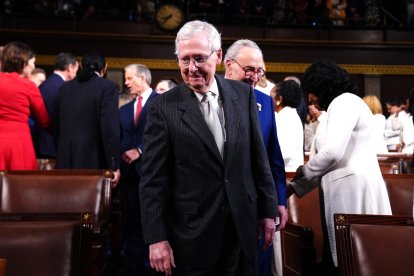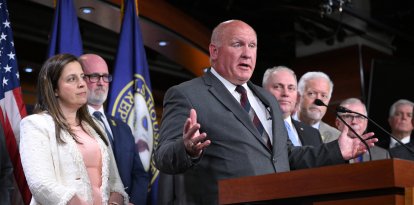Republicans regain majority in Senate
With some states still up in the air, the GOP managed to defeat Democratic incumbents in West Virginia, Ohio, thus reaching 52 members in the Upper House.

The GOP regained the Senate majority it had lost in 2020/ Shawn Thew
The Republican Party regained control of the Senate. With the outcomes in Wisconsin, Pennsylvania, and Michigan still pending, the GOP managed to turn Ohio and West Virginia red, securing the 52-seat threshold needed to reclaim the majority in the upper chamber they lost in 2020. Meanwhile, Senators Ted Cruz and Rick Scott easily won their races in Texas and Florida, effectively dashing Democrats' hopes of flipping any seats.
The first Democratic (or Independent in this case) seat to go Republican was West Virginia, with incumbent Governor Jim Justice obtaining a resounding victory with 68% of the vote to rival Glenn Elliot's 27%.
He was followed by Bernie Moreno. The Colombian-born businessman finally managed to banish Sherrod Brown, who had reached the Senate in 2007, from Washington DC. Although a closer race was expected, he defeated him by a difference of approximately four percentage points, 50.4% against 46.6%.
The third win for the Republican Party came from Tim Sheehy, who also managed to defeat a long-serving Democrat in the Senate. While the official confirmation is still pending, the businessman is expected to comfortably defeat Jon Tester, adding another seat to the GOP's tally.
As for Cruz and Scott, who had been top targets for Democrats from the start, they both easily outpaced their Democratic challengers. Cruz in Texas defeated Colin Allred by 11 percentage points, 54% to 43%, while Scott in Florida triumphed by a 13-point margin
The last headache for Republicans was Senator Debi Fischer of Nebraska, who faced a tougher-than-expected challenge against independent candidate Dan Osborn.
"Republican candidates were also helped by voters' poor view of the economy and inflation during President Biden's four years in office. Twenty-four percent of voters in battleground states such as Arizona, Michigan, Nevada, Nevada, Pennsylvania and Wisconsin ranked the economy as the most important issue in deciding their vote," explained The Hill.
With these results, the new majority would be 52-48, although the results of Nevada, Arizona, Wisconsin, Michigan and Pennsylvania are still pending.
RECOMMENDATION





















